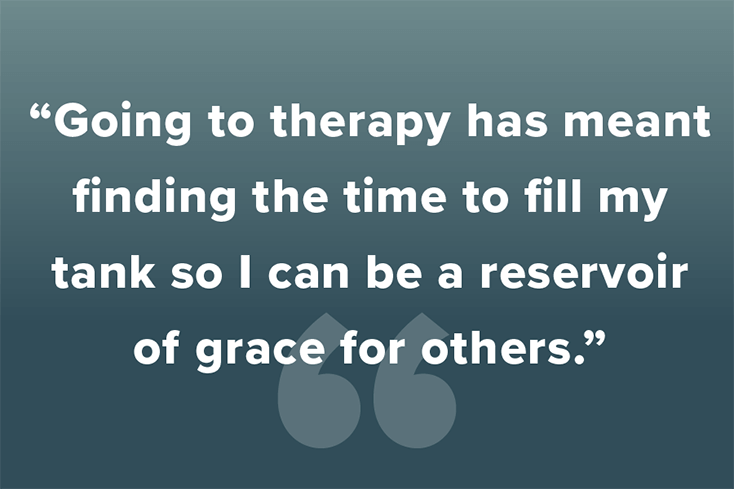June 08, 2023
By Maria Kitamura

I don’t even question taking time off for regular checkups with my dentist or eye doctor to help maintain my physical health. But it’s taken me two decades to accept that I need the same for my mental health.
The first time I was diagnosed with anxiety and depression was 27 years ago, when I woke up at home next to my crying newborn baby and started crying at the same time. “I can’t do anything for you. I’m helpless too,” I thought. Eventually I was able to soothe her, but this episode scared me enough to tell my husband I needed help.
At my first therapy session, I was given a prescription for Ambien and told to make sure I got seven hours of sleep. I felt better a few days later and went to one more session the following week. Then I stopped going. The clinic kept calling me to return for more treatment, but I ignored the calls, telling myself I was too busy. As a wife, mother, daughter, full-time employee, asking for help goes against everything I was raised to do — be the kind of person who gives help, not asks for it.
So instead of asking for and accepting help, I spent years swallowing my frustrations, day after day. I convinced myself I was fine, except every now and then I would reach my limit. With no knowledge of the stress and pain I was holding in, my family would suddenly be subjected to an extended rant that they began to call “the volcano.”
The first time my five-year-old son said to a family friend, “When my mom couldn’t find your house, she went into a rage,” I awkwardly laughed and said he was exaggerating, but inside I was mortified. I was trying to be “Super Mom,” but instead I was going through life like it was a 1,000-mile road trip, ignoring my gas gauge to prioritize completing my perpetual to-do list. This was not a habit I wanted to pass on to my children.
I knew I needed to change, but I couldn’t do it on my own. I felt like I was lost in the deep woods as darkness fell. As much as I love my friends and family, and they love me, a friend’s SUV wouldn’t be the right vehicle to get me out of these woods. I needed a professional crew with knowledge of the mind’s terrain and the right equipment to get back on the right path.
Paying a professional to focus on me and listen to my problems felt selfish, like indulging in a spa. But I found myself seeking out therapy again and again — during my children’s adolescent years, career changes, mourning the loss of a parent. Sometimes I needed medical intervention, sometimes I didn’t. Most of the time, I went to individual counseling, sometimes to a group. The methods may change depending on my situation, but over time, I realized that therapy is necessary as I navigate through transitions in life.
If my tooth was causing me pain, I wouldn't wait to go to the dentist. But I used to endure emotional and mental anguish for months before even thinking of going to a therapist. I wish I hadn't been so afraid of seeming weak or so quick to make excuses not to go. Sometimes, my mind needs help, and that’s ok. Going to therapy has meant finding the time to fill my tank so I can be a reservoir of grace for others. Instead of racing to go the distance through life to complete items on my to-do list, therapy reminds me to stop and check in, to make sure I also enjoy the view.
We’re always accepting submissions to the NAMI Blog! We feature the latest research, stories of recovery, ways to end stigma and strategies for living well with mental illness. Most importantly: We feature your voices.
LEARN MORENAMI HelpLine is available M-F, 10 a.m. – 10 p.m. ET. Call 800-950-6264,
text “NAMI” to 62640, or email. In a crisis, call or text 988 (24/7).